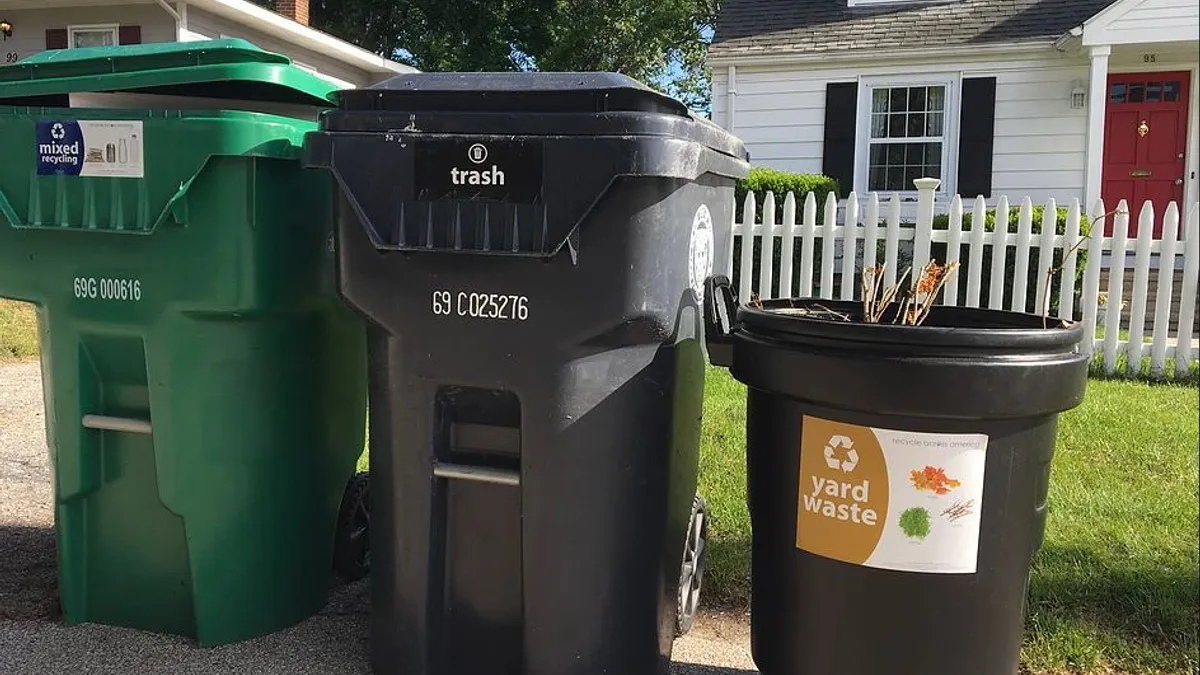Dive Brief:
- Several Virginia municipalities are ending or significantly altering their recycling programs following the announcement that recycler Tri City Waste Paper will shutter its nearby Tennessee facility. Washington County's Department of Solid Waste has since said all recycling "will be terminated, until further notice." Previously, residents could drop off paper, plastic and aluminum cans at one of the county's 14 depots, but the collection containers are expected to be removed by March 1.
- Until other options are found, Abingdon, Virginia will indefinitely suspend recycling and Bristol released a statement informing residents that paper and plastic recycling will be suspended effective March 1. Cardboard and metal cans will still be accepted at drop-off locations, but "[r]esidents are encouraged to reduce consumption of paper and plastic materials and to reuse items as appropriate."
- In a different part of the state, Norfolk is deciding what to do with their curbside recycling program following the announcement that hauler TFC Recycling will not serve the city after March 31. The Norfolk City Council heard a presentation last night about the region's recycling issues, and the city also has posted an online survey to garner public feedback on participation rates and residents' tolerance for fee increases.
Dive Insight:
Recycling programs across the country are being increasingly re-tooled in response to unfavorable market conditions. A number of Virginia communities, including Harrisonburg, were among the first in the country to experience the effects of China's scrap import ban, and as more recyclers feel pressure and contracts come up for renewal, a steady stream of program changes and cancellations continue to emerge.
Virginia is largely composed of small- to mid-sized cities and rural communities — its most populous city is Virginia Beach, at about 450,000 — with mountain ranges in the West and irregular coastlines in the East. All of these factors make recyclable material collection challenging and expensive — especially for communities trying to maintain curbside pick-up. In addition, far-flung small- and mid-sized communities don't have as many options when they lose a market or a recycling vendor. Cities such as Staunton, not far from Harrisonburg, are forced to weigh the community impact of canceling or significantly altering recycling programs in the face of ballooning costs and shrinking markets.
While many municipalities and recyclers across the country are quick to blame China for the current state of recycling in the United States, Norfolk recognizes it as a more complex issue. The city cites other factors, such as challenging glass markets and the overall health of the U.S. recycling industry. Numerous studies corroborate that U.S. recycling rates had been climbing until the early 2010s but flatlined or receded after 2012, with significant dips realized around 2015 and 2016 — well before China's National Sword was implemented in 2017. When highlighting the notable drop in aluminum can recycling from 2015 to 2016, the Aluminum Association notes that aluminum prices had also declined in recent years like other commodities.
The complexity of the situation is leading more recycling industry experts to the conclusion that current recycling difficulties might be an industry evolution rather than just a quick blip on the radar. Instead of bracing for a short-term change and attempting to wait out a down market, more municipalities — such as Marquette County, Michigan, where a MRF upgrade could lead to the introduction of a single-stream recycling program — are devising long-term solutions to ensure that programs adapt to changes and remain viable.














